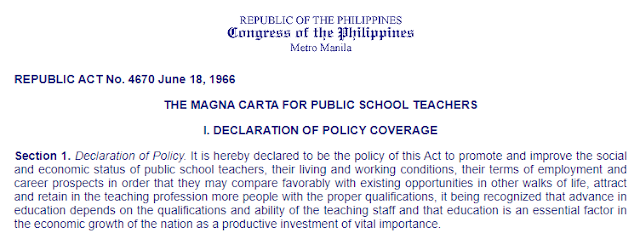The Magna Carta for Public School Teachers: A Synopsis
The Magna Carta for Public School Teachers (Republic Act No. 4670), enacted in 1966, is a landmark piece of legislation aimed at improving the lives and working conditions of public school educators in the Philippines. Here's a breakdown of its key provisions:

I. Declaration of Policy and Coverage:
- Aims to elevate the social and economic status of teachers, attract and retain qualified individuals, and recognize education's importance.
- Defines "teacher" as those involved in classroom instruction, guidance, library services, vocational training, and supervisory roles.
II. Recruitment and Career:
- Sets minimum educational qualifications for different teaching levels.
- Establishes probationary periods and tenure system.
- Prohibits transfers without consent except under specific circumstances.
- Mandates a Code of Professional Conduct for teachers.
- Guarantees fair disciplinary procedures with safeguards.
- Prohibits discrimination based on non-professional factors.
III. Hours of Work and Remuneration:
- Limits classroom teaching to a maximum of 6 hours daily, with additional compensation for exceeding that.
- Provides additional compensation for extracurricular and non-teaching activities.
- Establishes criteria for teacher salaries, emphasizing competitiveness, adequate living standards, and progression.
- Mandates salary scales with regular increments and cost-of-living adjustments.
- Ensures salary equality between national and local government-employed teachers.
- Grants special hardship allowances for challenging work environments.
- Requires salaries to be paid in legal tender and limits deductions.
IV. Health Measures and Injury Benefits:
- Provides free medical examinations for teachers upon entry and periodically throughout their careers.
- Covers necessary medical treatment and hospitalization as part of employment benefits.
- Recognizes work-related stress as a compensable occupational disease.
V. Leave and Retirement Benefits:
- Offers study leave opportunities with partial salary for professional development.
- Grants indefinite sick leave for lengthy treatment needs.
- Provides a one-range salary increase upon retirement, impacting lump sum and monthly benefits.
VI. Teacher's Organization:
- Guarantees freedom to form and join teacher organizations without interference.
- Prohibits discrimination based on organization membership or activities.
- Mandates consultation with national teacher organizations on policy and social security matters.
VII. Administration and Enforcement:
- Requires the Secretary of Education to create rules and regulations for implementation.
- Mandates budgetary estimates for implementing national government teacher benefits.
- Establishes penalties for interfering with teacher rights or violating the Act's provisions.
Conclusion:
The Magna Carta for Public School Teachers remains a significant effort to address the needs and rights of Philippine public school educators. While challenges in implementation persist, it continues to serve as a crucial framework for ensuring a dignified and well-supported teaching profession.
I hope this summary is helpful! Please let me know if you have any further questions or would like me to delve deeper into specific sections of the Act.
